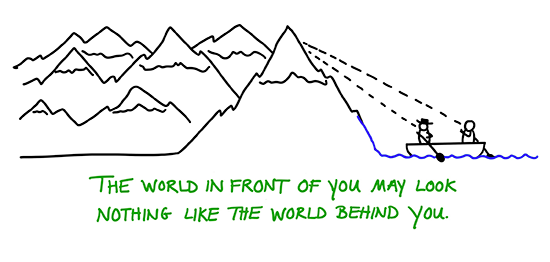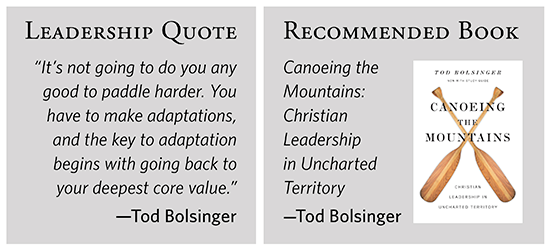
April-May 2020
The Unfinished Task
------------------
|





The column "Leadership Whiteboard" provides a short visual leadership coaching moment. It introduces and explains a new sketch in each issue, provides leadership coaching for further development, and shares a leadership quote and recommended book.
Canoeing the Mountains
This column was inspired by Tod Bolsinger’s book, Canoeing the Mountains, one of the top five Christian leadership books I have read. As with all books, none of us will agree on everything an author says, but this is a must-read for all pastors.
In 1803, when Thomas Jefferson completed the Louisiana Purchase, it doubled the size of the United States, adding much of what we now know as the Midwest and stretching into the Northwest. To discover what was in the territory, Merriwether Lewis and William Clark were commissioned to explore animal and plant life while exploring a passageway to the Pacific Ocean. Lewis, Clark, and their expedition party anticipated paddling upriver to the continental divide, hauling their canoes over the peaks, then coasting downhill to the ocean.

When they reached the high point of Lemhi Pass, they found neither the anticipated river nor a gently sloping plain toward their destination. Instead, they found rows of cascading mountains, taller than any in the East. Bolsinger describes this eye-opening moment with a phrase that will resonate with puzzled pastors and surprised leaders: “The world in front of you may look nothing like the world behind you.”
The culture has shifted dramatically, affecting our churches. Pastoring today looks nothing like it did a few years back, much less two decades ago. In other words, solutions that worked yesterday might pose problems today. Such situations require adaptive leadership, where the leader helps communities of people navigate and solve the complex problems threatening the health of their future. Bolsinger reminded us we can learn from Lewis and Clark, as adaptive leadership “pays attention to the deep underlying causes that keep a group perilously perched in the state of inaction.”
For Lewis and Clark, the other side of the mountains did not offer an easy float downstream. They had to hike, rappel, and traverse unexpectedly difficult terrain. Thankfully, their mission was not tied to a method. Like Lewis and Clark, we sometimes lead people “off the map” to places no one has been. Yet God’s call is more than a destination or method. It is built around His purpose for the journey: to pursue the heart of Christ while ministering in unexpected cultural terrain.
About the Columnist: Ron Hunter Jr., Ph.D., is CEO of Randall House
Publications.

|
|

